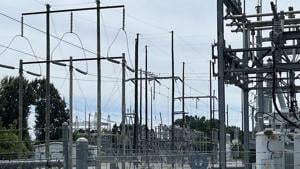
New Mexico attempts to counter Trump’s deportation agenda
The New Mexico legislature is attempting to counter the Trump administration’s immigration enforcement measures.
The Immigrant Safety Act, passed by the New Mexico House of Representatives in March, prevents state and local governments from cooperating with federal immigration enforcement. The bill also proposes blocking the state’s public lands from being used to build immigration detention facilities.
Three detention facilities already in New Mexico have faced allegations of human rights violations, according to the American Civil Liberties Union.
“Behind each detention bed is a human being – parents separated from children, workers torn from their communities, and asylum seekers who fled violence only to face new trauma in detention,” said Jessica Martinez, director of Policy at the New Mexico Immigrant Law Center.
According to the legislature’s website, the bill was passed onto the New Mexico Senate before votes on the action were postponed indefinitely.
The state legislature’s actions raise questions about whether the federal government or state government should have control over immigration enforcement and visa issuances.
In April, New Mexico passed a law allowing noncitizens who are approved by the federal government to become police officers, in an expansion of eligibility for the state’s law enforcement requirements.
The legislation paired New Mexico with states including California and Illinois that don’t require citizenship for a job in law enforcement.
New Mexico Sen. Cindy Nava, a Democrat sponsor of the bill, said shortages in the state’s law enforcement capacity could be helped by expanding eligibility requirements.
“[The bill] opens the door for individuals who might otherwise have never considered a career in law enforcement – people who are already working, living and contributing to our communities but were previously excluded from this essential work,” Nava said.
The legislation is part of an effort the state has attempted to implement for years.
In 2012, New Mexico’s legislature attempted to create a state-level guest worker program for foreigners who were residents in New Mexico. The bill allowed foreign nationals and their immediate family members who were living in New Mexico to obtain temporary work permits.
Foreign applicants for the program would need to undergo background checks and pay a fee equal to the amount of social security payments. An employer looking to hire a foreign worker would also need to pay a fee equivalent to a Social Security payment based on earnings.
“The intent of the Guest Worker Act is to have the state of New Mexico work in partnership with the federal government to achieve effective immigration reform that improves New Mexico’s security and prosperity and fosters a consistent, reliable and understandable immigration policy for all New Mexicans,” the bill reads.
New Mexico’s bill never became law. However, it appeared to be related to a flurry of state activity surrounding the 2012 Supreme Court case Arizona v. United States, where the justices ruled that Arizona could not impose its own immigration enforcement laws.
“It is fundamental that foreign countries concerned about the status, safety, and security of their nationals in the United States must be able to confer and communicate on this subject with one national sovereign, not 50 separate states,” Justice Anthony Kennedy wrote in the court’s majority opinion.
The question of state sovereignty over immigration enforcement has split legal experts and continues to be an issue the Supreme Court has yet to further clarify.
Latest News Stories

L.A. congresswoman insists on health insurance tax credits

Newsom threatens university funding over Trump’s education deal

Former Los Angeles schools chief runs against city’s mayor

Illinois quick hits: WARN report layoffs total 1,689; Powerball winners in Rochelle and Colona

No ethics reform in sight as ex-speaker’s scheduled prison term begins

Trump losing ground on economy, poll finds

Major tech company to cut H-1B visas amid Trump pressure, fee

US, India to hold new round of trade talks, with focus on energy

Johnson: Republicans ‘have plans’ to ‘fix’ Obamacare

Illinois House Speaker: ‘Mr. Trump, tear down this fence!’

Energy cost concerns loom as legislators look at policy changes

PJM exit: A price solution or power move?


